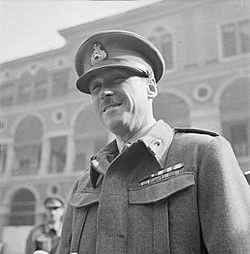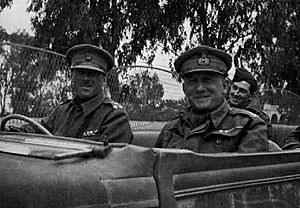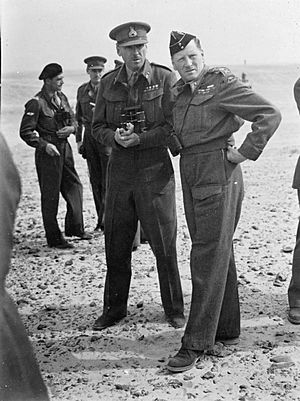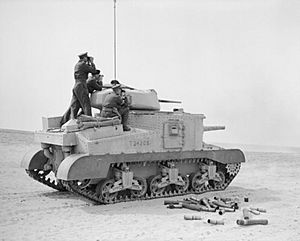Jock Campbell (British Army officer) facts for kids
Quick facts for kids
John Charles Campbell
|
|
|---|---|

Major-General Jock Campbell after being presented with the VC by General Sir Claude Auchinleck, 1941.
|
|
| Nickname(s) | "Jock" |
| Born | 10 January 1894 Thurso, Scotland |
| Died | 26 February 1942 (aged 48) near Halfaya, North Africa |
| Buried |
Cairo War Memorial Cemetery
|
| Allegiance | United Kingdom |
| Service/ |
British Army |
| Years of service | 1915–1942 |
| Rank | Major-General |
| Service number | 13594 |
| Unit | Royal Horse Artillery |
| Commands held | 7th Armoured Division (1942) 7th Support Group (1941–42) |
| Battles/wars | First World War Second World War |
| Awards | Victoria Cross Distinguished Service Order & Bar Military Cross Mentioned in Despatches |
John Charles Campbell (born January 10, 1894 – died February 26, 1942) was a brave officer in the British Army. People often called him Jock Campbell. He received the Victoria Cross, which is the highest award for bravery in battle for British and Commonwealth soldiers.
Contents
Early Life and Military Career
Jock Campbell was born in Thurso, Scotland. He went to school at Sedbergh School. When the First World War started in August 1914, he joined the army. After training, he became an officer in the Royal Horse Artillery in 1915.
He fought in France during the war. He was wounded twice. By the end of the war, he was a captain. He also earned the Military Cross (MC) for his bravery. Between the two World Wars, he became a very skilled horseman. He was excellent at both polo and hunting. He continued his work as an artillery officer.
Fighting in the Second World War
When the Second World War began, Campbell was 45 years old. He was a major leading a group of guns in Egypt. In June 1940, Italy joined the war. Campbell, now a lieutenant colonel, was in charge of the artillery for the 7th Armoured Division's Support Group.
The British Army had fewer soldiers than the Italians. So, General Archibald Wavell planned to keep attacking the enemy. They used fast-moving groups of soldiers and vehicles. Campbell was very good at leading one of these groups. His groups became known as "Jock columns."
Operation Compass and Awards
During a big battle called Operation Compass in February 1941, Campbell's guns were very important. They helped the 7th Support Group win a major victory at Beda Fomm. This battle led to the surrender of the Italian Tenth Army.
In April 1941, Campbell received the Distinguished Service Order (DSO). This award is for excellent leadership in battle. He received a second award for it soon after.
Battle of Sidi Rezegh
In September 1941, Campbell became an acting brigadier. He took command of the 7th Support Group. In November 1941, during Operation Crusader, his group was at an airfield near Tobruk. On November 21, 1941, two German tank divisions attacked them.
The British tanks suffered many losses. But they stopped the Germans from taking the airfield. Brigadier Campbell's small force held important ground. They were attacked many times. Wherever the fighting was toughest, Campbell was there. He was seen on foot, in his open car, or on a tank. He encouraged his troops.
The next day, he was still leading from the front. He directed his gun batteries. Twice, he even took over a gun himself when soldiers were hurt. He was wounded but refused to leave. His strong leadership helped his men keep fighting. They caused heavy losses for the enemy.
The fighting continued on November 23. Campbell had to pull back his remaining soldiers. For his actions during this battle, Campbell was awarded the Victoria Cross.
A German general, Johann von Ravenstein, admired Campbell's skill. Ravenstein commanded one of the German tank divisions Campbell had faced. Later, as a prisoner, Ravenstein spoke of his "greatest admiration" for Campbell. He remembered "all the many iron that flew near the aerodrome around our ears."
Promotion and Tragic Death
In February 1942, Campbell was promoted to Major-General. He was given command of the 7th Armoured Division.
Just three weeks after his promotion, Campbell died. His jeep overturned on a new clay road. The driver and other passengers were thrown out and knocked unconscious. Jock Campbell was considered one of the best commanders in the Eighth Army. He had been in North Africa since the war began. His death was a great loss to the army.
Victoria Cross Award
Jock Campbell's Victoria Cross medal is on display. You can see it at the Royal Artillery Museum in Woolwich, England.
Remembering Jock Campbell
There is a memorial to Campbell at his old school, Sedbergh School. It honors his brave actions. There is also a plaque and a bench in his hometown of Thurso. Major-General Campbell is also remembered on the War memorial in the village of Flore, England.
 | Delilah Pierce |
 | Gordon Parks |
 | Augusta Savage |
 | Charles Ethan Porter |




